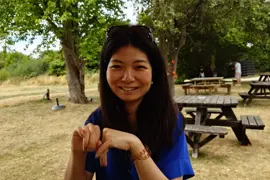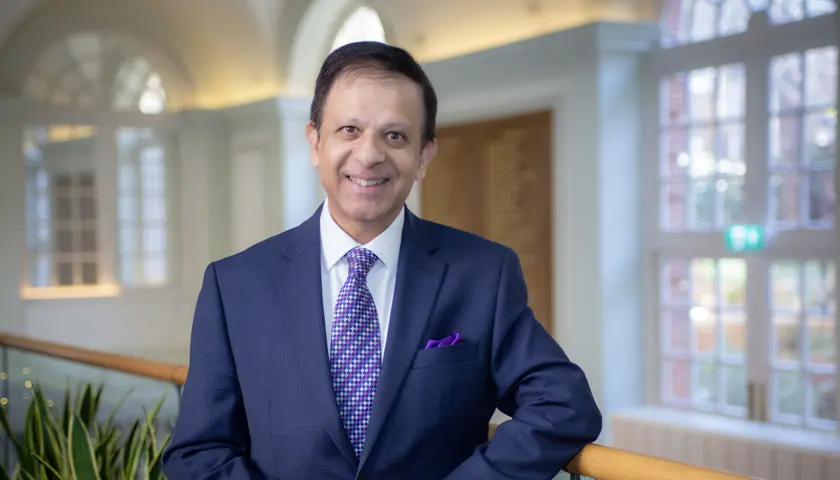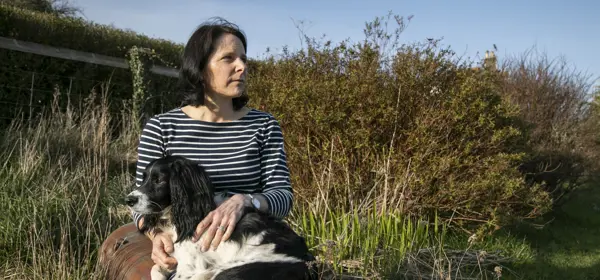
Back from the brink
Intense stress, and a feeling that no one is there to help, has tragically led to a number of doctors taking their own lives and caused others to consider it. To mark National Suicide Memorial Day for health and care workers, Seren Boyd meets those for whom it has a painful resonance
Content warning: suicide, mental illness
Before Miho Tsuda fell ill, she had always managed pressure well.
Then, in February 2021, she started specialty training in neurology at an unfamiliar London hospital where people did not know her. She was returning after a two-year break during which she had had a baby – and her mother was unwell.
She was also part of the cohort who began training without completing their MRCP Part 2 exam, which had been cancelled owing to COVID, so she was struggling with imposter syndrome.
Just one month in, Dr Tsuda (pictured above) began to suffer panic attacks. Her mind would go blank when she was asked questions in group teaching sessions. She would forget names and, during on-call shifts, had to fight the urge to run away.
In April, she was feeling so unwell she saw her GP but was ‘scared’ to hand in her sick note for two weeks’ leave.
‘I knew it would inconvenience the team, and there would be nobody to cover,’ she says. In May, she was hospitalised for five days with suspected aseptic meningitis.
By now, Dr Tsuda was physically and mentally exhausted – but determined not to let it show, as her Japanese heritage and the prevailing culture in medicine had taught her.
‘For us, showing any type of weakness or emotion is seen as not being strong. I wish that I could have cried and broken down at work, but I just couldn't. I never let any of this affect my work and I told no one, for a long time.’
Sick leave
When, in late summer, Dr Tsuda finally summoned the courage to ask supervisors about taking time out of training, the most immediate option seemed to be sick leave. There was no mention at that point of out-of-programme career breaks, which would allow her to keep her training number.
‘When things got really bad, I’d come home from work, fall asleep in my clothes, wake up the next day, shower and go to work. I would cry all of Sunday because I had to be at work on Monday.’
In September, her husband insisted she go back to her GP who signed her off, first for two weeks then six months. Remarkably, at her lowest point on sick leave, she decided to sit her MRCP Part 2 – and passed.
‘By then, I wasn’t showering, I wasn’t sleeping, just revising. Neurology was my dream job and my ultimate goal. So I thought to myself, if I can’t do this job in the way that I envisaged, then I should just die. For medics, medicine is our life and we feel it’s the only thing we know how to do.
‘My husband often tells me now: “You do realise you were very, very unwell?” I see posts about doctors who have taken their own lives, and it’s very sad but also very chilling because I know I was very close to that.’
I would cry all of Sunday because I had to be at work on Monday
Miho Tsuda
On 17 September last year, the charity Doctors in Distress together with NHS Practitioner Health held the first National Suicide Memorial Day for health and care workers. Since then, trees commemorating those who have died have been planted at medical establishments across the UK, including at BMA House in London. Similar events will take place around 17 September this year, too.
As well as providing space to honour health and care workers who have died by suicide, the memorial day is a call to action – for an end to stigma and for change at all levels to ensure workplaces are more supportive of staff wellbeing.
Tragically, one doctor dies by suicide about every three weeks and suicide rates among healthcare workers have been 24 per cent higher than the national average.
These statistics allude to distress on a much wider scale. In the latest NHS England report on NHS sickness absence rates, ‘anxiety/stress/depression/other psychiatric illnesses’ accounted for 27.7 per cent of all sickness absence in April – roughly double the rates in the UK labour force as a whole.
Sending a message
Amandip Sidhu founded Doctors in Distress partly to urge health workers to seek help rather than suffering in silence, following the death by suicide of his brother, consultant cardiologist Jagdip Sidhu.
As he told BMA members in his Victor Horsley lecture at this year’s BMA annual representative meeting, ‘I'm absolutely clear, and I accept the fact, that my brother chose to die in the way that he did because he wanted to send a message to the medical profession and the health systems primarily to say: “Look what's happened to me. Please do not let this happen to you."'
Dr Sidhu’s long and happy career in medicine turned sour when work pressures started to mount. He started ‘doing the job of two consultants’, recalls his brother, when a colleague took long-term sick leave. ‘Jagdip was probably only surviving on about three or four hours’ worth of sleep a night for months.’
Even when occupational health signed him off sick, Dr Sidhu was still messaging colleagues about patients’ test results.
In November 2018, Dr Sidhu emailed his wife and brother to say he had set all his affairs in order – and was at Beachy Head.
At his inquest, the coroner said workload was a major contributor to Dr Sidhu’s death. Isolation too had proved lethal, Mr Sidhu told ARM.
‘My brother had no leadership in his workplace. He was left completely on his own, like many of you, and just left to get on with it.’
My brother was left completely on his own, like many of you, and just left to get on with it
Amandip Sidhu
Stigma around mental health is still a ‘very real problem’ in the healthcare profession, believes Chaand Nagpaul, co-chair of Doctors in Distress and a former BMA council chair.
‘Because health workers’ raison d’être is to care for others, there is a mindset among some that being mentally distressed, feeling burnt out, feeling not able to cope, is somehow a sign of weakness or failure,’ he says.
‘Actually, it would be surprising if colleagues were not in distress, given the environment we work in.’
Staff shortages, backlogs, waiting lists and contractual demands all conspire to make conditions gruelling and shifts intense. Serial moral injury caused by not being able to do one’s best for patients is fuelling mental distress and burnout. For some, feelings of isolation are stoked by bullying, discrimination or vexatious complaints.
Dr Nagpaul fears that people feel ‘guilty about feeling distressed’ and that many are not speaking up because there’s no ‘give’ in the system: taking time out would only put more pressure on colleagues.
‘Where people are struggling to manage their own workloads because they don’t feel safe to speak out about the fact they’re not coping, and have unfair demands placed upon them, we have a very serious issue. Worse still, they fear that if things go wrong, they will be blamed.’
Since 2008, 32 doctors have taken their own lives while being investigated by the GMC.
The NHS 10-year plan is explicit about the need to reduce sickness rates among the healthcare workforce – but contains ‘no detail on the how’, says Dr Nagpaul.
Health workers will continue to struggle until the systemic pressures fuelling their distress are addressed, he insists.
Tackling these structural issues will require robust government policy, including ‘contracts that make space for wellbeing’, but also a concerted effort by leadership within organisations.
‘Doctors, including the BMA, have been very clear about the factors that create distress in the workplace: being asked to do more than they're capable of doing physically, to work in environments where there aren't enough of them, to do two things at once, to carry a bleep for an emergency ward while being in an operating theatre.’
Urgently needed are ‘compassionate’, confidential systems of support, through occupational health and peer support services such as those provided by the BMA, Doctors in Distress and NHS Practitioner Health (see end of article for details).
‘Many healthcare workers feel that if they report mental distress, they don’t have the confidence that their employer will understand or provide the support they need,’ says Dr Nagpaul.
It would be surprising if colleagues were not in distress, given the environment we work in
Chaand Nagpaul
Dr Tsuda received help from Health Education England’s Professional Support Unit and NHS Practitioner Health; services available differ across the UK. She says all staff members should be made aware of them and be able to signpost them – especially those in supervisory roles.
Dr Nagpaul insists that the costs involved in providing support and reducing workloads would be recouped through reduced sickness rates, greater productivity and improved patient care.
‘There is a cost associated with improving wellbeing but there’s a greater cost in ignoring the need to address it, given that shockingly six million estimated working days are lost from the NHS each year due to sickness from mental health problems.’
'No shame in being human'
Dr Tsuda returned to training in February 2024 – after an 18-month break – and is doing well.
Any fears she had about colleagues doubting her capacity to cope proved unfounded. ‘People know me better now, and realise I’m hard-working or well liked by colleagues and that’s really helped. I’ve also learnt to speak up when I need a bit of support – usually something very small, like having a second registrar available to support if needed.’
Dr Tsuda chooses to speak out now because she wants to spare others the pain she suffered. At least one friend left medicine ‘because they just didn't know what else to do’. Many she has shared with have admitted to experiencing distress.
Isolation traps people in the lie that they’re ‘the only ones going through it’, she says. ‘I just thought that there was something wrong with me, that I wasn't capable of doing the job. I didn't recognise that I had a problem that could be fixed or helped. But help is available.’
Dr Nagpaul urges colleagues to look out for one another – and distrust outward appearances. He recalls a ‘gregarious’ nurse he knew in his first year as a junior doctor who died by suicide.
‘There is a lot more we could do around just checking in with each other, having opportunities to socialise, talk to each other, having huddles so that people feel less isolated and more able to be open,’ he says.
Amandip Sidhu too concluded his ARM lecture by urging doctors to look after themselves and one another.
‘Don't try to be perfect in an imperfect system. Sometimes good enough, I think, is good enough. Please do look after those around you as well. Please, please do not end up like my brother. Please ask for help. There is absolutely no shame in being human.’
- The BMA’s free and confidential 24/7 counselling line (0330 123 1245) and peer support service are open to all doctors and medical students. More details of wellbeing support offered by the BMA and by other organisations are available on the BMA website
-
Doctors in Distress provides free, confidential, online group-based programmes on burnout and mental health for all healthcare workers. Sign up online
- NHS Practitioner Health is a free, confidential NHS primary care mental health and addiction service with expertise in treating health and care professionals.



